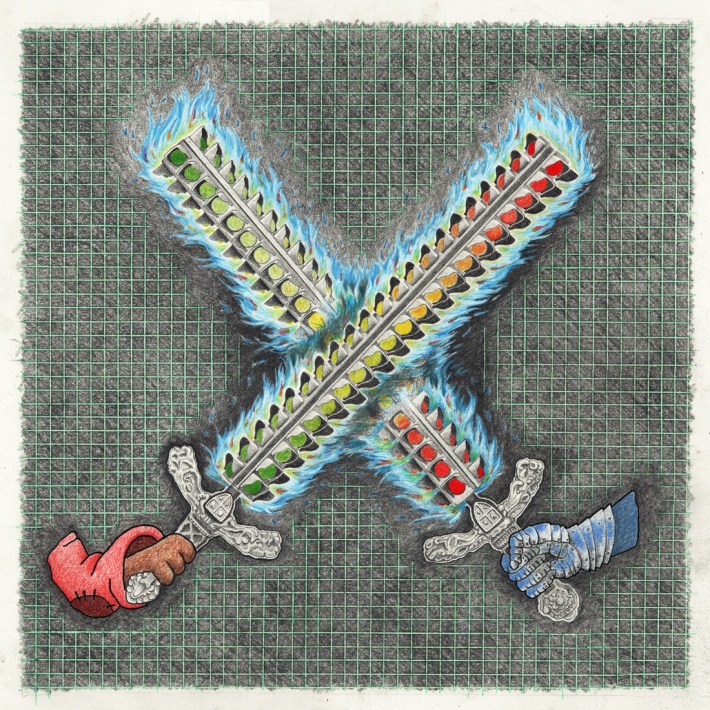Even if you're finding Fievel Is Glauque through the dystopian choices made by the algorithm of your choice, it still feels like you're unearthing something archaic and unsung. The globetrotting duo's output sounds like it should adorn the grooves on the type of long-forgotten LP you could stumble upon in the back of a dusty record shop. It makes sense why: The band was co-founded by Brooklyn-by-way-of-Brattleboro, Vermont avant-garde veteran Zach Phillips. He spent the 2010s using his anti-capitalist, no frills temperament to shape the label OSR Tapes while he also played in underground acts like Blanche Blanche Blanche, Grendel's Mother, and Perfect Angels. Fievel Is Glauque finds Phillips building upon this unique background, teaming up with Brussels, Belgium-based singer Ma Clément for an enigmatic band that thrives on curmudgeonly spontaneity.
Phillips and Clément were introduced by their mutual friend (and soon to be collaborator) Eric Kinny back in 2018 during a moment of serendipitous chaos. Phillips was subletting a friend's studio in Brussels for a spell, loosely working on some music but mostly on vacation. Things took an unexpected turn when Phillips hit his temple on a pole and knocked himself out for a second. Worried that Phillips might experience a head injury, Kinny called a coworker who'd studied nursing to diagnose him. That colleague ended up being (you guessed it) Clément, who, upon meeting them at a bar, decided Phillips didn't have any warning signs of a concussion or hemorrhage. "We met because we needed to meet. That's my interpretation of the events," Clément cryptically tells me over Zoom.
Phillips and Clément hit it off and started working on music together, eventually enlisting a fluid crew of collaborators to flesh out their ideas. The end result was Fievel Is Glauque's 2021 release, God's Trashmen Sent To Right The Mess, a 20-track, 34-minute record issued in mono. "Some of those recordings are from, like, literally the first time we all hung out and played through some songs," says Phillips. "It's very unprofessional." The record sounds a bit like it was recorded with a potato (I've fondly described the endeavor's sonics as cardboard box-esque to friends before), but it inventively blurs the lines between bossa nova, mid-century pop, and freewheeling jazz nonetheless. And if you're wondering what the hell the band name means, it's fittingly haphazard and inexplicable. Fievel is a character from the children's animated film series An American Tale (which Phillips and Clément refuse to ever watch) and "glauque" is a French word for a dodgy shade of bluish gray. Nothing about their early music is particularly polished or sensible. But it laid an intriguing blueprint for a band whose future was uncertain, given the constraints of impending distance.
"It's great and it's annoying at the same time," Clément says, when asked about the impact that being an intercontinental project has on Fievel Is Glauque's process. "Like, we cannot really get sick of each other because it's so short when we meet, usually. But it's so intense. It has to all happen during those few weeks when we meet. And then nothing happens, so it's, like, waves. It's very unclear."
Fievel Is Glauque's proper debut album, Flaming Swords, came to life while Phillips was once again living in Brussels. The music was written more gradually this time around. Clément would go over to Phillips' space once or twice a week to write. They did this around 25 times, and these sessions yielded roughly 20 songs. Clément claims to be shy, so they occasionally tried a wordless process when working on this batch of music. Over tea, she would sing melodic fragments, which Phillips would try to match on the piano. They'd communicate nonverbally, embracing a faith-based mentality that Phillips describes as "arcane." Slowly, the snippets would line up and the structures set themselves. It helped the duo not to get too caught up in debates over themes and vibes. Clément's verse frequently takes cadence and harmony into account more than meaning. She fills in the blanks once the vocal patterns have already been settled upon. This element of abstraction infuses her singing with an essence of idiomatic psychedelia. "As steam stays under the lid/ Rumor stays right and grammar stays hid/ By parting the leaves you meet the sublime/ And there a fake you find/ Just a comedy of bogus touch," she sings over a rollicking, fluctuating instrumental on the single "Save The Phenomenon."
Fievel Is Glauque walked into the sessions surrounding Flaming Swords with a more defined outline than the one they had for God's Trashmen. The recordings present a snapshot of the frantic-but-chill energy that birthed them. After getting approved for a residency at the Brussels workspace/venue VOLTA, Phillips and Clément asked a group of five musicians (guitarist/bassist Anatole Damien, bassist/guitarist Raphaël Desmarets, alto saxophonist Johannes Eimermacher, drummer Gaspard Sicx, and Kinny on pedal steel) to be a part of the record. They rehearsed nine full times on 20 songs, going off of charts that Phillips had drawn up. After playing a couple shows, they went back to the studio and laid these 18 cuts live to tape in a single block. "That was a really long day," Phillips says. "I got there at, like, nine in the morning and we didn't leave until 1AM." As a tragic nightcap, Clément ate shit on her bike on the way home from the studio. When I joke that accidents seem to follow the band, both members laugh in agreement. "We love concussions," Clément jokes wryly.
The songs on Flaming Swords move fast. The longest, the bubbly closer "Clues Not To Read," clocks in at just under four and a half minutes. But the other 17 tracks all hover around or below the two minute mark. "Little Bad Miracle" plays like a number from some bizarre musical meant to be staged in an old burlesque theater. "4000 Rooms" is jittery and ornate, loungey guitar chops peeking out from behind funky horns. Meanwhile, the lush electric piano burbles on "Days Of Pleasure" land in between the stylings of Weldon Irvine and Mahavishnu Orchestra. The flighty curtness that underlines the record is probably just the logistical byproduct of an unusually speedy creation process. But it's also what keeps things digestible and gripping – a necessary contrast to the album's trippy aural murk.
Phillips and Clément claim to be hostile to the notion that they're influenced by other contemporary bands. Instead, they point to travel, obscure Uruguayan music, and the natural ecosystem that has arisen from members of their ever-evolving backing band as their main sources of inspiration. (After our interview, Phillips emails me a sprawling list of 28 musicians who have played in Fievel Is Glauque's lineup so far.) While the music certainly dwells in its own universe that feels intentionally isolated from current trends, it calls to mind the hypothetical outcome of Times New Viking and Sonny Sharrock co-producing an album from an indie pop band like Crumb.
The music itself comes over every other part of being a band for Fievel Is Glauque. When I ask a question based on the new record's liner notes, at first both members seem sort of baffled that press materials accompany the album. Clément tends to be pretty elusive and reserved. But once she and Phillips start bantering, the nurturing chemistry between them becomes apparent. He often coaxes answers out of her, which typically end up manifesting themselves as flowery, poetic tangents. Clément lived a lot of lives prior to starting Fievel Is Glauque – she attended both nursing and architecture schools, lived in Germany and France, was a painter, and wrote some melodies for a defunct hard rock band – but she was never actually a performing musician. Over video chat, it's easy to see how much Phillips believes in her talents and gently nudges her out of her shell. Her path into the world of experimental music might not have been conventional, but she's a gifted autodidact whose lack of theoretical knowledge helps offset the headiness of the complex arrangements that support her vocals.

An air of aloof cool attaches itself to Fievel Is Glauque, so much so that they seem somewhat nonplussed when asked about their recent tour with Stereolab. The aforementioned band's manager hit them up out of the blue over Bandcamp, clearly realizing that they were kindred spirits as French-Anglo jazz/indie acts. But it took a fair amount of time for Fievel Is Glauque to see the message, since it went straight to spam. It wasn't until later, when a mutual friend asked Phillips if he'd turned down the offer, that he finally noticed the request.
"It really came as a surprise, and it was extremely logistically challenging to make it happen. I felt like we were really vindicated," Phillips says. "We're this out-of-nowhere band that released a bunch of mono cassette recordings of rehearsals. It's totally chaotic. We had no idea that this music would reach so many people, and then to be offered a tour where we're supposed to play for so many people with this very esteemed and, like, long term band… It was like the world saying, like, 'What you're doing is valuable.'" They were ultimately honored to have embarked on such a legit tour as a fledgling DIY band. But Phillips and Clément agree that the time they spent on the road was simultaneously rewarding and exhausting.
As Fievel Is Glauque were preparing for that run of shows, they used their time in the same place to record a new album's worth of material, backed by an octet. They say it was an involving, intense process that already bores them to revisit. They create quickly in real life but are still trying to find successful ways to collaborate while they're in different countries. Phillips volunteers that he's an impatient and difficult person to work with, but this restless quest for slipshod perfection feels distinctly tethered to the band's mad-genius factor. Though they already have around 100 recordings to their name, Fievel Is Glauque would rather look forward than take the time to analyze the fruits of their past labor. "When it's always in motion, you don't look at the things you have in your luggage. You just move them with you," says Clément. "I have a backpack which is full of maybe cool things, but I just don't take the time to open it and go through it." This eccentric, sometimes frustrating ethos is what makes Fievel Is Glauque so timelessly singular.

Flaming Swords is out 11/25 on Math Interactive, with physical release expected in February. Pre-order it here.
We rely on reader subscriptions to deliver articles like the one you're reading. Become a member and help support independent media!






